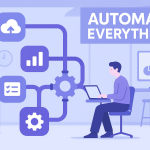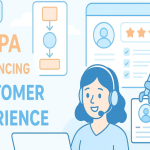Open-Source RPA Tools: Are They a Good Fit for Your Business?

Open-source RPA tools: are they a good fit for your business? This question is becoming more relevant as companies of all sizes look for affordable automation solutions. Traditional RPA leaders like UiPath, Automation Anywhere, and Blue Prism dominate the market—but their licensing costs can be challenging for startups and small to mid-sized businesses.
This is where open-source Robotic Process Automation (RPA) comes into play. In this blog, we’ll break down what open-source RPA is, its pros and cons, the leading platforms available, and whether it’s the right choice for your company.
What Are Open-Source RPA Tools?
Open-source RPA tools are automation platforms where the source code is available publicly. Developers can view, modify, and distribute the software without paying expensive license fees.
These tools allow businesses to:
- Build automation workflows.
- Customize bots for unique processes.
- Integrate with APIs, databases, and third-party apps.
- Deploy without the upfront costs of commercial RPA licenses.
Need help understanding how open-source automation works? Our experts at DecaSoft Solutions are here to simplify the journey for you.
Advantages of Open-Source RPA Tools
- Cost Savings
No hefty licensing fees—only costs for hosting, development, and optional support. - Flexibility
Developers can customize workflows and add new features without vendor restrictions. - Community Support
Strong developer communities provide documentation, plugins, and bug fixes. - Transparency
Open codebase ensures full visibility, which is especially valuable for businesses with compliance or security requirements. - Scalability for Experimentation
Businesses can test automation ideas without committing to expensive enterprise contracts.
Limitations of Open-Source RPA
- Technical Expertise Required
Unlike no-code commercial platforms, open-source RPA often requires coding knowledge. - Limited Enterprise Support
Community-driven support may not match the reliability of vendor-backed tools. - Integration Gaps
Some open-source tools may lack prebuilt connectors available in commercial RPA. - Scalability Concerns
Managing bots at scale may be harder without vendor-provided orchestration platforms.
👉 “Popular open-source RPA tools like OpenBots, OpenRPA, TagUI, and Robot Framework are empowering businesses to automate without heavy licensing costs—our experts can help you choose the best fit for your needs.”
Leading Open-Source RPA Tools
1. OpenBots
- Built as an enterprise-grade open-source RPA platform.
- Offers orchestration, desktop automation, and connectors.
- Paid services available for enterprise support.
2. OpenRPA
- Strong integration with Node-RED and Flow-based programming.
- Flexible for developers who want deep customization.
- Active community support.
3. TagUI
- Lightweight, command-line–based RPA tool.
- Easy to script web automation and scraping tasks.
- Maintained by AI Singapore.
4. Robot Framework
- Popular in test automation, but also used for RPA.
- Requires Python knowledge for full customization.
- Large community with plugins.
Open-Source vs Commercial RPA
| Aspect | Open-Source RPA | Commercial RPA |
|---|---|---|
| Cost | Free (support optional) | High licensing fees |
| Ease of Use | Requires coding | User-friendly, drag-and-drop |
| Support | Community-driven | Vendor-backed |
| Customization | High flexibility | Limited by vendor |
| Best For | Developers, startups | Enterprises, non-technical users |
When Open-Source RPA Is a Good Fit
- Your business has in-house developers or technical teams.
- You want to avoid high licensing costs.
- You need custom workflows not available in standard RPA platforms.
- You’re running pilot projects before scaling enterprise automation.
When Commercial RPA Is Better
- Your team has limited technical expertise.
- You need drag-and-drop workflow design.
- Your company requires vendor-backed SLAs and 24/7 support.
- You’re scaling to thousands of bots across departments.
The Future of Open-Source RPA
By 2030, open-source RPA is expected to play a much bigger role. As communities grow and hybrid models (open-source core + paid enterprise features) mature, these tools will become increasingly viable even for mid-sized companies.
Final Thoughts
Open-source RPA tools: are they a good fit for your business? The answer depends on your resources and needs. If you’re a small business or startup with technical expertise, open-source RPA can deliver automation at a fraction of the cost. If you’re a large enterprise prioritizing ease of use and full-scale orchestration, commercial platforms may still be the better choice.
At DecaSoft Solutions, we help businesses evaluate, select, and implement the right RPA platform—whether open-source or commercial.




